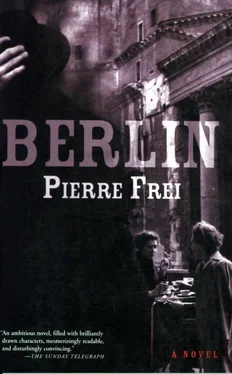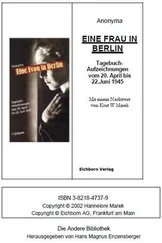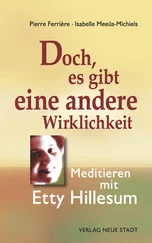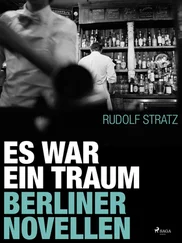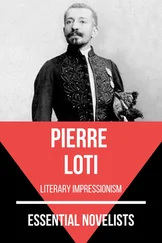What seemed like endless seconds of waiting heightened her excitement. She thought she could already feel his firm body and her tongue between his lips. At last the door opened. She had the words 'John, darling' on the tip of her tongue. But the woman in the doorway got in first. 'John, darling,' she called over her shoulder.
She instantly knew the identity of this woman in the housecoat standing in front of her, hair rather dishevelled, a glass in her hand, and she knew the woman had come to claim her property. Like a wounded deer, Jutta turned and ran.
John Ashburner came out of the bathroom. Ethel was amused. 'Rather impulsive, your young lady.'
'I'm going after her,' he said firmly.
The inspector turned into Argentinische Allee. His stump hurt every time he pushed the pedals down. The bicycle rattled quietly. Candlelight flickered in a few windows, as if Christmas had come early. But it was October, the electricity was off, and there was a murderer cruising somewhere, through the mild, starlit night. He listened to the headphones as if expecting them to answer his question.
He went through the week's events in his mind. Where had he been? What had he been doing? Captain Ashburner had shown him the beeping transmitter. He had been to Mr Chalford's office with Muhlberger to ask about the card index of employees. He had searched the garage in secret, and tampered with the motorbike. He had been on cycle patrol for the last three nights. Somewhere and at some time during the past week, an idea had occurred to him. He had filed it away in his subconscious, and now it was lying there, refusing to be dredged up to the surface.
A faint beeping chirped in the headphones and soon grew stronger. Dietrich braked, laid his bicycle flat on the pavement, and ducked down behind a switchbox beside the road. The motorbike roared past not two metres from him, the rider's goggles reflecting the clear night sky.
Getting on his bicycle. Dietrich followed the fading beep, which showed him that the motorbike was moving away. He had no chance on his old bike. But to his surprise, a minute later the signal grew stronger again, swelling to a fortissimo. His adversary must be very close.
He stopped, looked all round — and saw the small box with the metallic gleam. It was stuck to the lamppost in front of him. His enemy had tricked him.
Something came rushing toward him with concentrated force from the nearby main road. The NSU 300! A dull thud flung him to the ground. His enemy swerved around and returned to the attack. Dietrich rolled aside, but not fast enough. There was an ugly crunch, as if all his bones were breaking. The motorbike raced away.
He lay there helpless. Suddenly revelation struck him like a thousandvolt electric shock. There it was, the connection he had desperately been trying to make for days on end. He tried to get up. He failed. The tyres of the heavy motorbike had crushed his prosthesis, and now it was hanging at a bizarre angle from the stump. Turning up his trouser leg, he unstrapped it.
A jeep was approaching, its searchlight sweeping the pavement. Dietrich raised an arm and waved, but just before the jeep reached him the searchlight switched to the other side of the road. His calls were drowned out by the sound of the engine. The hell with it, I have to get to my feet somehow, he thought. To my foot, he corrected himself.
He turned over and crawled on hands and knees to the street light where his bicycle was lying. It was barely three metres, but it seemed like miles. He hauled himself up by the lamppost. Only at the third attempt did he succeed in picking up his bike. Grasping the handlebars with both hands, he put his half leg over the middle bar and got himself into the saddle. He pushed off with his sound foot. For a few seconds he thought he would tip over, but he soon found out how to keep his balance. Pushing down the pedal, he brought it up again with his instep. It worked better than he'd expected. He got up some speed. There was no time to lose. He hoped the guard would let him telephone the American prohibited zone. And then he had an appointment with the killer.
Benny Goodman and the laughing voices mocked her, and the bright glow of the floodlights burned Jutta's eyes. She pulled herself together. She mustn't let go. She wasn't going to give the other woman the satisfaction.
There was no electricity on the other side of the barrier. She strode energetically forward. She was furious with herself and with John. He'd lied to her. A nice little adventure to see him through until Ethel arrived, that was what he wanted, and silly goose that she was, she'd served it up to him on a silver salver.
She stopped and breathed deeply. The night air did her good. She remembered all that lay behind her. The nights of air raids. The Red Army hordes. The unspeakable humiliations. And here she was getting upset over an American to whom, after all, she had given herself willingly! 'Let's forget it!' she heard Jochen saying. It was what he'd said after their first marital tiff, which led to a delightful reconciliation in bed. She smiled.
A sound brought her back to reality. Jutta turned. A figure emerged from the darkness, arms raised. A chain came around her neck, clinking. Breathing hard, her attacker tugged at her dress. She was gasping like a landed fish. Her hands clutched empty air. The chain cut off her breath. Violet squiggles danced before her eyes. In the last few seconds before death by strangulation you see your whole life pass before your eyes again, she thought; now where did I read that?
WAS IT A dream or reality? She felt his weight on her and his prick deep between her thighs. His face was hidden in the darkness. Jochen? Or the other man, the man she hadn't yet met but would meet some day? He did exist, this man, how else could she dream of him? Her heart was thudding persistently, as if it were Mutti knocking on the door.
It was Mutti. 'Seven o'clock, child!' she cried. Reluctantly, Jutta hauled herself out of bed. She was all hot and damp between her legs. She would have loved to go back into her dream and see his face. His blurred features were still before her as she stood under the shower. In the kitchen she spread her usual breakfast roll with butter, watching a fly crawling over Kaiser Wilhelm's nose. The old gentleman with his mutton-chop whiskers hung on the door of the pantry. Jutta's great-grandfather, very much the loyal subject, had pinned him up there long ago.
Mutti poured coffee from the big, blue enamel pot that stood on the castiron stove. Its coals glowed even at night. A couple of workers were talking in loud voices over an early beer in the bar. Vati laughed approvingly at some remark. He often laughed like that, a short and almost surprised burst of laughter. It saved him the trouble of keeping up a conversation. Mutti put the pot back on the stove. The black brew would stay warm there in case a guest ordered coffee. 'Do we expect you home this evening?'
'It all depends.' She had no idea what it all depended on, she was fending off the questions that Mutti would ask next: why didn't they finally get married? Spending the night with a man, even your fiance, was improper. Jochen should know that too, as an educated man who was aware of his responsibilities.
'I must be off' She avoided the bar and left the Red Eagle through the kitchen garden. It was ten minutes' walk to Kopenick station.
In the train she took Hans Fallada's new novel out of her briefcase. As a future bookseller she had to keep up to date. Today she had the last pages of a depressing story about a hopeless hero in a penitentiary to read.
When she had finished the book she played at guessing what kind of people the other passengers were, with their grave, cheerful, indifferent, friendly or hostile faces. A gentleman in a Homburg hat, his waistcoat stretched tight over a rounded paunch: a jeweller, insurance agent, teacher? He hid his Party badge behind the Lokalanzeiger, and Jutta read the newspaper headlines for this day in July 1934. Austria's Chancellor Dollfuss Assassinated — Hans Stuck wins German Grand Prix for Auto Union — Marie Curie Dies.' The old woman opposite, who had a basket full of eggs, a ham, two sausages and a bunch of rhubarb, must come from Rahnsdorf, Zeuthen or even further out in the country, bringing good nourishing food for city children. The lady in the hat and cotton gloves was surely on her way to have a comfortable gossip over coffee at Kranzler's or the Cafe Schilling with other ladies in hats and cotton gloves. The air force major with his white summer cap and battered leather case was probably on the way to his desk in the new Reich Aviation Ministry.
Читать дальше
